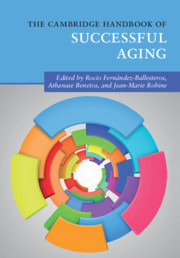Book contents
- The Cambridge Handbook of Successful Aging
- The Cambridge Handbook of Successful Aging
- Copyright page
- Contents
- Figures
- Tables
- Contributors
- Introduction
- 1 The Concept of Successful Aging and Related Terms
- 2 The Biomedical Bases of Successful Aging
- 3 Successful Aging and the Longevity Revolution
- Part I Biomedical Aspects
- Part II Psychosocial Factors
- 16 Bio-Psycho-Social Bridge
- 17 The Adaptation Process of Aging
- 18 Behavioral Health
- 19 Effects of Environmental Enrichment and Training across Life Span in Cognition
- 20 Wisdom
- 21 Emotions and Successful Aging
- 22 Personal Control and Successful Aging
- 23 Coping Mechanisms through Successful Aging
- 24 Spirituality and Transcendence
- 25 Intergenerational Family Relationships and Successful Aging
- 26 Involvement with Life and Social Networks
- 27 Defining “Success” in Exceptional Longevity
- 28 Promoting Successful Aging
- 29 Promoting Successful Aging in the Community
- Part III Socio-Demographic Issues
- Index
- References
20 - Wisdom
The Royal Road to Personality Growth
from Part II - Psychosocial Factors
Published online by Cambridge University Press: 10 January 2019
- The Cambridge Handbook of Successful Aging
- The Cambridge Handbook of Successful Aging
- Copyright page
- Contents
- Figures
- Tables
- Contributors
- Introduction
- 1 The Concept of Successful Aging and Related Terms
- 2 The Biomedical Bases of Successful Aging
- 3 Successful Aging and the Longevity Revolution
- Part I Biomedical Aspects
- Part II Psychosocial Factors
- 16 Bio-Psycho-Social Bridge
- 17 The Adaptation Process of Aging
- 18 Behavioral Health
- 19 Effects of Environmental Enrichment and Training across Life Span in Cognition
- 20 Wisdom
- 21 Emotions and Successful Aging
- 22 Personal Control and Successful Aging
- 23 Coping Mechanisms through Successful Aging
- 24 Spirituality and Transcendence
- 25 Intergenerational Family Relationships and Successful Aging
- 26 Involvement with Life and Social Networks
- 27 Defining “Success” in Exceptional Longevity
- 28 Promoting Successful Aging
- 29 Promoting Successful Aging in the Community
- Part III Socio-Demographic Issues
- Index
- References
Summary
- Type
- Chapter
- Information
- The Cambridge Handbook of Successful Aging , pp. 355 - 371Publisher: Cambridge University PressPrint publication year: 2019

